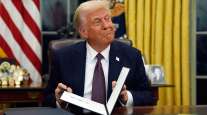US-China Trade War to Worsen Before 2019 Deal, Survey Shows

Economists expect the trade war between the world’s two largest economies to get worse before it gets better — culminating in a deal by year-end.
President Donald Trump on May 10 increased tariffs on $200 billion in Chinese goods and the Asian nation retaliated, prompting traders to price in a U.S. interest-rate cut this year and sending global stocks plunging. A Bloomberg News survey on May 13 showed a majority of 40 economists see Trump following through on his threat to impose additional 25% tariffs on all remaining imports from China, with a plurality expecting those higher levies by the third quarter.
“Both sides want a deal but there will be more escalation and more tension before they get a deal,” said David Sloan, senior economist at Continuum Economics, who sees a trade pact reached this year and higher tariffs imposed by the third quarter.

“It is in the economic interest of both sides to reach a deal,” Sloan said. “This will hit the U.S. economy significantly and probably the Chinese economy even more.”
Underscoring that sentiment, Trump on May 13 warned China against taking steps to substantially retaliate. He also said he’s planning to meet with Chinese President Xi Jinping at next month’s Group of 20 summit, and Treasury Secretary Steven Mnuchin signaled that talks are better than markets assumed. Bloomberg’s survey concluded just as the U.S. Trade Representative’s office released a list of about $300 billion of Chinese goods including toys and phones that Trump has threatened with as much as a 25% tariff.
Overall, the trade war is increasing the chances of an even worse scenario. Four-fifths of economists surveyed say that higher tariffs heighten the risk of a recession in the U.S. by the end of next year. While first-quarter economic growth blew past estimates, the expansion is forecast to cool as the boost from tax cuts wears off and global demand slows. That kind of scenario — tariffs dragging down already-weaker growth — could encourage the Federal Reserve to cut interest rates, according to almost half of the respondents.

The latest breakdown in talks has prompted an escalation in the tariff war that looks increasingly like the International Monetary Fund’s worst-case scenario for a global economy already forecast to grow this year at its slowest rate since the immediate aftermath of the 2008 financial crisis.
Two-thirds of economists see a trade agreement between the U.S. and China this year, while almost a fifth expect one by 2020.




